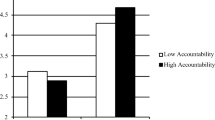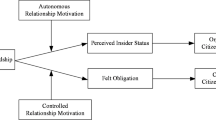Abstract
This article in the journal “Gruppe. Interaktion. Organisation (GIO)” bridges Adam Grant’s popular concept of givers, takers and matchers to state-of-the-art theories and research of prosocial organizational behavior such as Organizational Citizenship Behaviour (OCB). By proposing a three-dimensional framework of social orientation, the authors provide an approach allowing the reconciliation of inter-individual differences of social motives and situational factors, enabling cooperative behavior in the workplace. The practical implications of encouraging cooperative behaviour and collegial support are indicated for individual (personnel selection and development), team (team design and values) and organizational (organizational culture development) levels.
Abstract
Der Artikel für die Zeitschrift „Gruppe. Interaktion. Organisation. (GIO)“ verbindet Adam Grant’s anschauliches Konzept der Geber, Nehmer und Tauscher mit dem aktuellen Stand der Forschung zum prosozialen Verhalten in Organisationen, insbesondere Extrarollenverhalten (OCB). Die Autoren stellen ein dreidimensionales Modell sozialer Werteorientierung vor, welches kooperatives Verhalten am Arbeitsplatz als Zusammenspiel interindividueller Unterschiede sozialer Werteorientierungen und Situationsfaktoren versteht. Praktische Ansatzpunkte für die Förderung kooperativen Verhaltens und kollegialer Unterstützung werden auf den Ebenen des Individuums (Personalauswahl und -entwicklung), des Teams (Teamdesign und Werte) und der Organisation (Entwicklung einer Kooperationskultur) aufgezeigt.



Similar content being viewed by others
References
Bierhoff, H.-W. (2010). Psychologie prosozialen Verhaltens: warum wir anderen helfen (2nd edn.). Stuttgart: Kohlhammer.
Bolino, M. C. (1999). Citizenship and impression management: good soldiers or good actors? The Academy of Management Review, 24(1), 82–98.
Bolino, M. C., & Grant, A. M. (2016). The bright side of being prosocial at work, and the dark side, too: a review and agenda for research on other-oriented motives, behavior, and impact in organizations. The Academy of Management Annals, 10(1), 599–670. doi:10.1080/19416520.2016.1153260.
Bolino, M. C., Turnley, W. H., & Niehoff, B. P. (2004). The other side of the story: reexamining prevailing assumptions about organizational citizenship behavior. Human Resource Management Review, 14(2), 229–246.
Bolino, M. C., Klotz, A. C., Turnley, W. H., & Harvey, J. (2013). Exploring the dark side of organizational citizenship behavior. Journal of Organizational Behavior, 34, 542–559.
Brief, A. P., & Motowidlo, S. J. (1986). Prosocial organizational behaviors. The Academy of Management Review, 11(4), 710–725.
Chan, W. (2003). Analyzing ipsative data in psychological research. Behaviormetrika, 30(1), 99–121. doi:10.2333/bhmk.30.99.
Cohen, S., & Wills, T. A. (1985). Stress, social support, and the buffering hypothesis. Psychological Bulletin, 98(2), 310–357.
De Cremer, D., Mayer, D. M., van Dijke, M., Schouten, B. C., & Bardes, M. (2009). When does self-sacrificial leadership motivate prosocial behavior? It depends on followers’ prevention focus. Journal of Applied Psychology, 94(4), 887–899.
De Dreu, C. K. W. (2006). Rational self-interest and other orientation in organizational behavior: a critical appraisal and extension of Meglino and Korsgaard (2004). Journal of Applied Psychology, 91(6), 1245–1252.
De Dreu, C. K. W., & Nauta, A. (2009). Self-interest and other-orientation in organizational behavior: implications for job performance, prosocial behavior and personal initiative. Journal of Applied Psychology, 94(4), 913–926.
Van Dyne, L., Cummings, L. L., & McLean Parks, J. (1995). Extra-role behaviors: in pursuit of construct and definitional clarity. In L. L. Cummings & B. M. Staw (Eds.), Research in organizational behavior (vol. 17, pp. 215–285). Greenwich: JAI Press.
Fishbein, M., & Ajzen, I. (1975). Belief, attitude, intention, and behavior: an introduction to theory and research. Reading: Addison-Wesley.
Flynn, F. J. (2003). How much should I help and how often? The effects of generosity and frequency of favor exchange on social status and productivity. Academy of Management Journal, 46(5), 539–553. doi:10.2307/30040648.
Furnham, A., Treglown, L., Hyde, G., & Trickey, G. (2014). The bright and dark side of altruism: demographic, personality traits, and disorders associated with altruism. Journal of Business Ethics, 134(3), 359–368.
George, J. M. (1991). State or trait: effects of positive mood on prosocial behaviors at work. Journal of Applied Psychology, 76(2), 299–307.
George, J. M., & Brief, A. P. (1992). Feeling good-doing good: a conceptual analysis of the mood at work-organizational spontaneity relationship. Psychological Bulletin, 112(2), 310–329.
Grant, A. M. (2008). Does intrinsic motivation fuel the prosocial fire? Motivational synergy in predicting persistence, performance, and productivity. Journal of Applied Psychology, 93(1), 48–58.
Grant, A. M. (2013). Give and take: a revolutionary approach to success ; [why helping others drives our success]. London: Weidenfeld & Nicolson. Paperback ed
Hamilton, W. D. (1964). The genetical evolution of social behavior. I and II. Journal of Theoretical Biology, 7, 1–52.
Kichuk, S. L., & Wiesner, W. H. (1997). The big five personality factors and team performance: implications for selecting successful product design teams. Journal of Engineering and Technology Management, 14(3), 195–221.
Koopman, J., Lanaj, K., & Scott, B. A. (2016). Integrating the bright and dark sides of OCB: a daily investigation of the benefits and costs of helping others. Academy of Management Journal, 59(2), 414–435.
Korsgaard, M. A., Meglino, B. M., & Lester, S. W. (1996). The effect of other-oriented values on decision making: a test of propositions of a theory of concern for others in organizations. Organizational Behavior and Human Decision Processes, 68(3), 234–245.
Van Lange, P. A. M. (1999). The pursuit of joint outcomes and equality in outcomes: an integrative model of social value orientation. Journal of Personality and Social Psychology, 77(2), 337–349.
LePine, J. A., Erez, A., & Johnson, D. E. (2002). The nature and dimensionality of organizational citizenship behavior: a critical review and meta-analysis. Journal of Applied Psychology, 87(1), 52–65.
LePine, J. A., Buckman, B. R., Crawford, E. R., & Methot, J. R. (2011). A review of research on personality in teams: accounting for pathways spanning levels of theory and analysis. The Role of Personality in Human Resource Management, 21(4), 311–330. This issue also contains regular papers.
Liebrand, W. B. G., & McClintock, C. G. (1988). The ring measure of social values: a computerized procedure for assessing individual differences in information processing and social value orientation. European Journal of Personality, 2(3), 217–230.
Lievens, F., Ones, D. S., & Dilchert, S. (2009). Personality scale validities increase throughout medical school. Journal of Applied Psychology, 94, 1514–1535.
Luthans, F., & Youssef, C. M. (2007). Emerging positive organizational behavior. Journal of Management, 33(3), 321–349.
Meglino, B. M., & Korsgaard, A. (2004). Considering rational self-interest as a disposition: organizational implications of other orientation. Journal of Applied Psychology, 89(6), 946–959.
Meglino, B. M., & Korsgaard, M. A. (2006). Considering situational and dispositional approaches to rational self-interest: an extension and response to De Dreu (2006). Journal of Applied Psychology, 91(6), 1253–1259.
Miller, D. T. (1999). The norm of self-interest. American Psychologist, 54(12), 1053–1060.
Motowidlo, S. J., & Van Scotter, J. R. (1994). Evidence that task performance should be distinguished from contextual performance. Journal of Applied Psychology, 79(4), 475–480.
Organ, D. W. (1988). Organizational citizenship behavior: the good soldier syndrome. Lexington: Lexington Books.
Organ, D. W. (2015). Organizational citizenship behavior A2. In J. D. Wright (Ed.), International encyclopedia of the social & behavioral sciences (2nd edn., pp. 317–321). Oxford: Elsevier.
Pelled, L. H., Eisenhardt, K. M., & Xin, K. R. (1999). Exploring the black box: an analysis of work group diversity, conflict, and performance. Administrative Science Quarterly, 44, 1–29.
Penner, L. A., Fritzsche, B. A., Craiger, J. P., & Freifeld, T. S. (1995). Measuring the prosocial personality. In J. Butcher & C. D. Spielberger (Eds.), Advances in personality assessment vol. 10 Hillsdale: LEA.
Penner, L. A., Dovidio, J. F., Piliavin, J. A., & Schroeder, D. A. (2005). Prosocial behavior: multilevel perspectives. Annual Review of Psychology, 56, 365–392.
Perugini, M., Gallucci, M., Presaghi, F., & Ercolani, A. P. (2003). The personal norm of reciprocity. European Journal of Personality, 17(4), 251–283.
Podsakoff, P. M., & MacKenzie, S. B. (1997). Impact of organizational citizenship behavior on organizational performance: a review and suggestions for future research. Human Performance, 10(2), 133–151.
Romer, D., Gruder, C. L., & Lizzadro, T. (1986). A person–situation approach to altruistic behavior. Journal of Personality and Social Psychology, 51(5), 1001–1012.
Rushton, J. P., Chrisjohn, R. D., & Fekken, G. C. (1981). The altruistic personality and the self-report altruism scale. Personality and Individual Differences, 2, 293–302.
Simpson, B., & Willer, R. (2008). Altruism and indirect reciprocity: the interaction of person and situation in prosocial behavior. Social Psychology Quarterly, 71(1), 37–52.
Smith, C. A., Organ, D. W., & Near, J. P. (1983). Organizational citizenship behavior: Its nature and antecedents. Journal of Applied Psychology, 68(4), 653–663.
Trivers, R. (1971). The evolution of reciprocal altruism. Quarterly Review of Biology, 46, 35–57.
Utz, S., Muscanell, N., & Göritz, A. S. (2014). Give, match, or take: a new personality construct predicts resource and information sharing. Personality and Individual Differences, 70, 11–16.
Williams, L. J., & Anderson, S. E. (1991). Job satisfaction and organizational commitment as predictors of organizational citizenship and in-role behaviors. Journal of Management, 17(3), 601–617.
Author information
Authors and Affiliations
Corresponding authors
Rights and permissions
About this article
Cite this article
Mäthner, E., Lanwehr, R. Givers, takers and matchers – Reciprocity styles and their contribution to organizational behaviour. Gr Interakt Org 48, 5–13 (2017). https://doi.org/10.1007/s11612-017-0358-6
Published:
Issue Date:
DOI: https://doi.org/10.1007/s11612-017-0358-6
Keywords
- Prosocial organizational behavior (POB)
- Cooperation
- Prosocial motives
- Organizational citizenship behavior (OCB)
- Social Value Orientation (SVO)
- Organizational effectiveness
- Altruism
- Reciprocity




